Internship in Family Sciences
Internship in Family Sciences
The internship requirement for Family Sciences majors allows students to apply classroom knowledge in an employment setting as a means of further developing and practicing knowledge and skills.
See Internship Opportunities (Updated 7/2021) How to Plan for Your Internship See Internship Highlights - February 2019
Internship Profiles
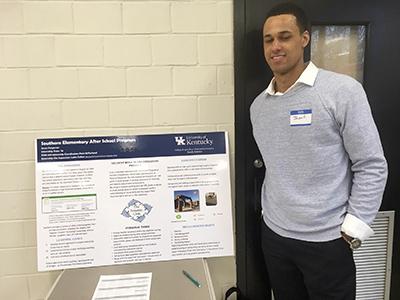 Name: Jason Fergerson
Name: Jason Fergerson
Major: Family Sciences
Expected graduation date: May 2018
Internship location: Southern Elementary School (Lexington, KY)
Please describe your typical day as an intern:
I volunteered and was involved with the Dolphin Club, which is the after-school care program. I worked with the kids on their homework, coordinated games and fun activities. I also worked with at-risk children to improve their behavioral, social, and communication skills.
How are you using and applying classroom knowledge in your internship?
I am using knowledge from the classroom to communicate and listen better to the students – as well as empower the young students to become better individuals.
What is one key thing you have learned during your internship?
During my internship, I learned listening and communication skills with coworkers (other faculty members) and clients (the students).
If you could share one piece of advice for other students who are preparing to complete an internship, what would it be?
Pick somewhere that could provide skills used in the workforce of your individual choice, somewhere that could easily carry over post-graduation. Overall, this class was very beneficial in strengthening my personal skills.
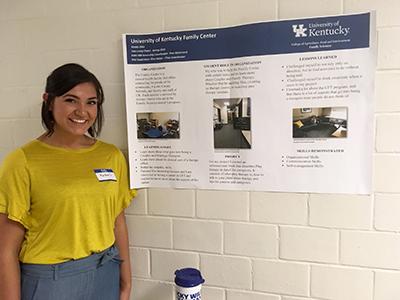 Name: Kirstie Otto
Name: Kirstie Otto
Major: Family Sciences
Expected graduation date: May 2018
Internship location: University of Kentucky Family Center (Lexington, KY)
Please describe your typical day as an intern:
For my typical day, I would clean and organize all the therapy rooms, audit files, other clerical duties, and watch previously recorded therapy sessions.
How are you using and applying classroom knowledge in your internship?
I applied a lot of my classroom knowledge into my internship. Since the Family Center is a part of Family Sciences, I was able to think back to previous classes and see how they go further into a career, especially when watching therapy sessions.
What is one key thing you have learned during your internship?
One key thing that I have learned during my internship is how to be a self-starter. I have always found it difficult to do things without direction. But with doing my project, I was able to learn how to use my own mind and be creative.
If you could share one piece of advice for other students who are preparing to complete an internship, what would it be?
One piece of advice that I would give to other students who are preparing to complete an internship would be to not be afraid to ask questions and do not be scared to think of things on your own.
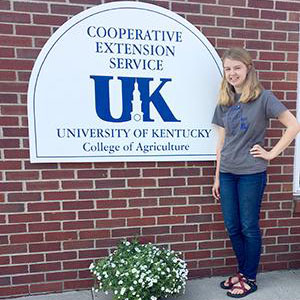 Name: Rachel Hart
Name: Rachel Hart
Major: Family Sciences
Expected graduation date: May 2018
Internship location: Woodford County Cooperative Extension
Please describe your typical day as an intern:
On a normal day, I start by checking emails. Each morning, I also take time to catch up on things from the previous day. Then, I usually do any task my supervising agent has for me. This could be assisting with materials for an upcoming program, leading or assisting in a workshop or project day, or creating promotional materials for a program. It varies day to day. Some days, I'm in the office all day working at my desk, while other days I am out in the community working. On days when my supervising agent does not have urgent tasks for me to complete, I will often assist the other agents and staff with their projects.
How are you using and applying classroom knowledge in your internship?
Last semester, I took the FAM 360 class called Introduction to Family Intervention: Working with Families and Individuals. The curriculum we covered discussed how family science students are on track to become helping professionals. While I might not be working in a counseling profession, I am still able to apply many of the strategies we learned in my internship as I interact with those in the Woodford County community, including coping with stressful situations and active listening.
What is one key thing you have learned during your internship?
I have learned to get outside my comfort zone. Whether I am making phone calls to 4-H Camp parents or going to a state livestock judging contest when I knew nothing about livestock judging, these experiences have given me unique learning opportunities. Each day I have been challenged with exploring and finding more about who I am and who I want to be.
If you could share one piece of advice for other students who are preparing to complete an internship, what would it be?
My advice would be to begin scheduling yourself now. It can be strange going from a college student's schedule of intermittent classes each day to a consistent 8-hour work day.
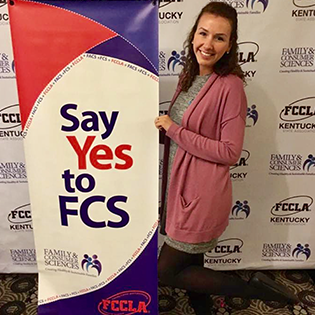 Name: Madison Showalter
Name: Madison Showalter
Major: Family Sciences
Expected graduation date: May 2017
Internship location: Kentucky Department of Education with the Family and Consumer Science State Supervisor in Frankfort, KY
Please describe your typical day as an intern:
My day usually starts by checking in with my supervisor, the State Supervisor, and she will give me a list of objectives to get done for the day. I have been given tasks such as organizing lessons on the state website, assisting with the preparation of and attending an advocacy day for Family and Consumer Sciences in Frankfort, or even spending three days in Louisville at the FCCLA State Meeting assisting my supervisor with various sessions! I have had the opportunity to participate in a lot of great experiences and have learned even more than I imagined about family and consumer sciences at the state level.
How are you using and applying classroom knowledge in your internship?
I have been using the communication skills that I learned in the classroom often during this internship. I have used my knowledge of working with individuals over the different stages of the human lifespan. I understand that meeting and speaking with retired FCS teachers is different than working with the middle school students at the state meeting, so when communicating with these separate audiences I am able to effectively present my message. I have enjoyed putting my family science coursework into action as I work in this capacity.
What is one key thing you have learned during your internship?
The key thing I have learned is that there are things you might not feel confident doing, but those are the things you need to do! The more you step out of your comfort zone the more you grow. You might feel uncomfortable at first, but looking back you will be thankful you took the opportunity so you can continue to grow.
If you could share one piece of advice for other students who are preparing to complete an internship, what would it be?
My advice for others would be to network as much as possible during your internship because all of the professionals you are meeting could lead to a potential career opportunity. The more people you meet and make connections with, the bigger and stronger your network becomes.
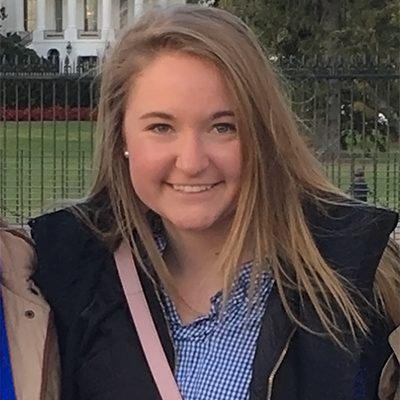 Name: Michaela Mineer
Name: Michaela Mineer
Major: Family Sciences
Minor: Community and Leadership Development
Expected graduation date: May 2018
Internship location: Family, Career and Community Leaders of America National Headquarters in Reston, VA
Please describe your typical day as an intern:
Each morning I would begin with networking. This may seem like an unusual approach, yet I found that by starting my day by speaking with the staff around the office, I made more connections and started off the day in a positive way. After making my rounds through the office, I would check in with my direct supervisor, the Director of Communications. Quickly, the two of us would go over what the priorities were for that day, and I would update her on the progress and completion of any tasks. After this morning routine, I would know exactly what needed to be done that day. The tasks usually involved emailing state advisors and national officers, creating documents for the national officer elections, preparing scripts for the National Leadership Conference, and communicating with the officer candidates about the election process.
How are you using and applying classroom knowledge in your internship?
Since it was my job to work with the National Executive Council and the National Officer Candidates, I found myself using a lot of the knowledge I learned in my minor, Community and Leadership Development. Intrapersonal communication, understanding the differences in each person’s leadership style, and time management were concepts I applied each and every day.
What is one key thing you have learned during your internship?
During the 10 weeks I spent in this internship I learned more than I ever imagined. One specific thing that I walked away remembering is the importance of details. In my role, I learned how the small details that go into the National Executive Council’s scripts, the planning of the general sessions, and the lesson plans and workshop materials really do play an essential role in the overall success of the National Leadership Conference. I have always been a perfectionist, yet this summer I learned how to work in a faster paced environment while remaining focused on the little details.
If you could share one piece of advice for other students who are preparing to complete an internship, what would it be?
My advice would be to ask questions. My supervisor always emphasized that mistakes happen, yet it is essential to turn the mistake into a learning experience. For me this came through asking questions. Asking questions not only allows you to brainstorm solutions, it also facilitates growth and expresses to your employer that you are there to learn.
